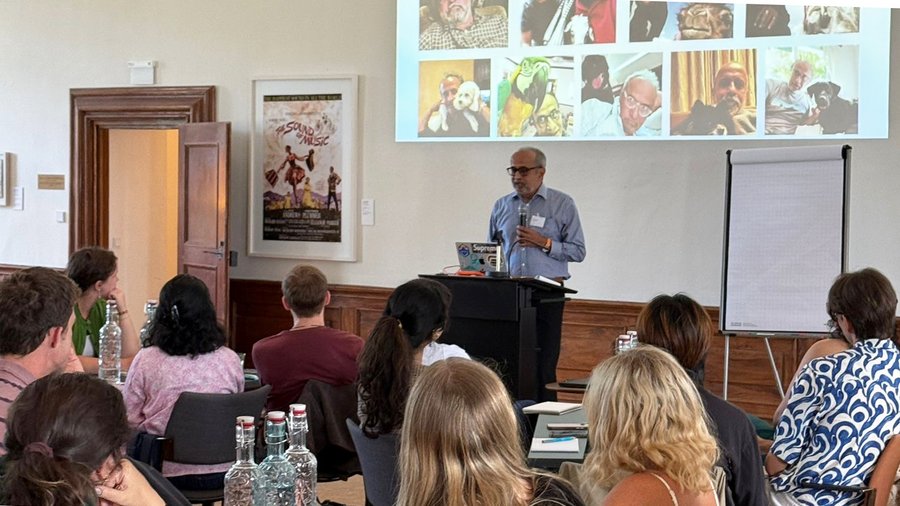Longtime faculty member Sanjeev Chatterjee held the annual Bailey Morris-Eck Lecture at the 19th Salzburg Academy on Media and Global Change
Stories have always been a way for people to connect, challenge ideas, and imagine better futures. At the 19th Salzburg Academy on Media and Global Change, participants were invited to think about the power of storytelling in today's rapidly shifting world.
Award-winning filmmaker and University of Miami professor Sanjeev Chatterjee delivered the Bailey Morris-Eck Lecture at this year's Media Academy, opening with a simple but compelling statement: “I am here to tell you a story - I want you to believe me.”
Sanjeev is a documentary storyteller who directed, wrote, and produced the 2007 documentary “One Water.” He is also the founder and president of the Florida-based non-profit Media for Change.
He spoke to participants about "The Hyper-Democratization of Storytelling," linking his presentation to the Media Academy's focus this year on "Local Media Futures and Democratic Health."
Facing Change and Finding Opportunity
Sanjeev acknowledged what he coined as the “ever-evolving existential crisis,” focusing on the anxieties surrounding the widespread implementation of artificial intelligence (AI) and fears of job displacement.
Yet, he encouraged participants to think about how to persevere in the face of this adversity or anxiety. Quoting the American philosopher Eric Hoffer, he reminded them, “It still holds true that man is most uniquely human when he turns obstacles into opportunities.”
Echoing this sentiment, Sanjeev shared his belief that “The only way to frame moving forward is to try to figure out where the opportunities are.” For Sanjeev, a key opportunity lies in media’s ability to foster community. He pointed to the rise of digital creators in recent years. The idea that a creator needs a million followers has faded, according to Sanjeev. Even “Micro-creators,” individuals with 5,000 to 20,000 followers, produce high engagement rates from their niche audiences.
Reflecting on the shift from traditional television news to the fragmented, always-on world of social media, Sanjeev noted how today’s media landscape enables diverse voices and competing narratives. Instead of resisting this change, he encouraged participants to embrace it, both in the media and within themselves, saying, “Beauty is in the evolution of what someone becomes.”
“How can you make a movie a movement?”
Sanjeev posed a central question: “How can you make a movie a movement?” He emphasized that the community a project can create matters more than the number of people who tune in. He highlighted the important role websites, social media, and apps play in creating these groups. Online platforms give people the chance to share and discuss their beliefs and form meaningful connections.
He has exemplified this belief in his own work, including his documentary “One Water.” The film aimed to inspire audiences worldwide to care about safe, potable water, and it successfully reached over 400 million households.
A Call for Inventiveness
Throughout his lecture, Sanjeev challenged students to question assumptions, push boundaries, and build inventive ways of bringing people together across differences. He advised them to be inventive instead of constantly following the path set before them. Sanjeev said, “The first necessity is to question ‘what.’ What will it take for you to become more inventive and begin your journey to build your community?” He encouraged participants to find creative ways of bringing people from different spaces together to connect over shared values.
For the veteran documentarian, delivering the annual Morris-Eck lecture felt like an elevated responsibility in comparison to his longstanding role as a faculty member at the Media Academy. “I’ve been coming to the Salzburg Academy on Media and Global Change since 2008,” Sanjeev said. “This was a step up. In terms of my thinking, this was an important milestone in my own projection, but also the responsibility of trying to find something meaningful to say to young people.”
The Bailey Morris-Eck Lecture, established in 2004, has long been a platform for global leaders in media to reflect on pressing issues. This year, Sanjeev’s message resonated with a timely urgency: In a world of constant disruption, storytelling remains one of humanity’s most powerful tools - not just to inform, but to connect, inspire, and imagine new possibilities.
As Sanjeev reminded participants, the future of media is not just about technology or platforms. It is about people, their stories, and the communities they build along the way.
Sanjeev Chatterjee is an award winning, veteran documentary storyteller, professor, and mentor. Apart from teaching at the School of Communication, University of Miami, he is the founder/president of the Florida based non-profit organization Media for Change.
The Bailey Morris-Eck Lecture is an annual lecture on international media, economics, and trade which was established in 2004 through the generosity of former Salzburg Global Board of Directors member Bailey Morris-Eck and her family.
The Salzburg Academy on Media and Global Change is an annual program that convenes emerging leaders in media fields to build networks for positive change. If you would like to find out more about the Academy, please email , Faculty Chair and Program Director.


